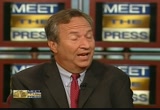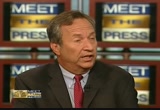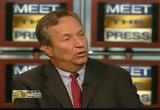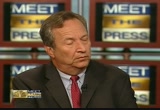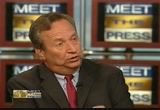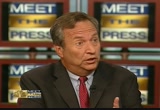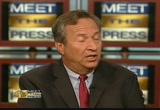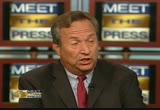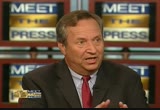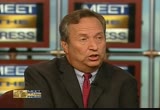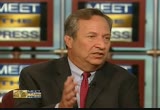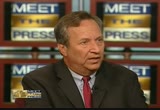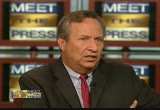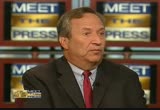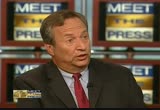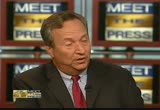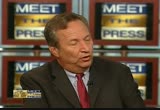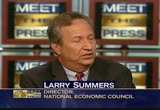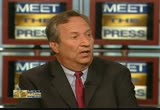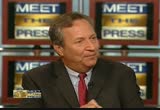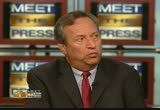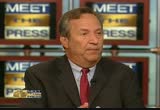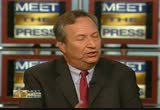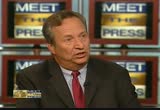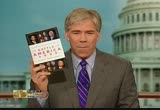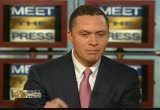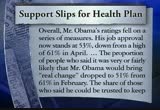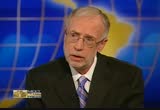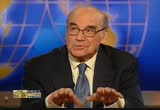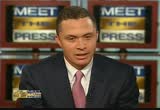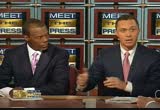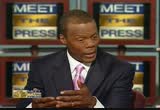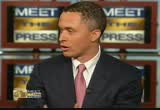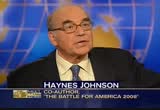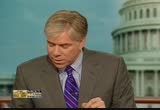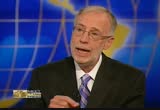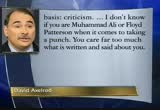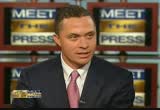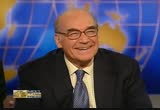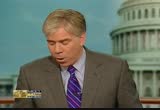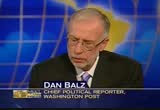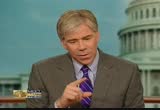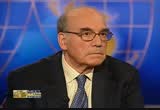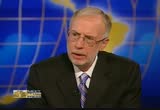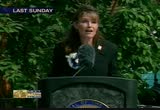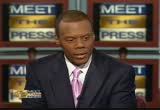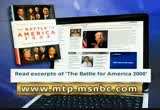tv Meet the Press MSNBC August 3, 2009 2:00am-3:00am EDT
2:00 am
statistics all suggested a vertical decline. none of that is the situation right now. we're certainly starting to see a turnaround, a turnaround in production that leaves most professional forecasters to expect that if you look at economic output over the next six months it's actually likely to start to increase. now, the jobs picture's going to be serious for a long time to come. the best that can be said so far is the rate at which we're losing jobs is declining. but there, too, the picture is improving. we've got a long way to go. we're going to need to carry through with a full program that the president has put in place. we're going to need to continue to take steps to stimulate the economy like the very successful cash for clunkers program so that we're keeping at, dng
2:01 am
everything we can to push this economy forward. but we are in a very different situation. we have walked back from what we were facing six months ago, and that is because of the policies that were put in place. >> when do you think the economy starts growing again? >> i think if you look at the overall output statistics, the gdp, as economists call it, very great likelihood -- and this is what most professional forecasters say -- is that we'll see growth going forward in the second half of this year. why? inventories have been run down, and firms are going to have to build those inventories back. the evidence is that from a very, very low base housing production, automobile sales are likely to start to increase, and the recovery and reinvestment program is going to gather force
2:02 am
over the next six months as people are able to spend more of the extraordinary tax favors they'v received, as more and more of the 3,000 projects come online and start to spend out. already in florida you see 14,000 teachers' jobs that wouldn't have been there this spring preserved as a consequence of the recovery act. so, all these factors, the rising impact of the recovery act, inventory accumulation, what's going to happen, housing and automobiles, these all are leading in -- you know, don't trust those of us in the administration. most professional forecasters to expect output growth. now, historically, this is why we are absolutely not complacent. we continue to be very dissatisfied with the way the economy is. historically, increased hiring typically lags increases in
2:03 am
output, so it's going to take time before you see it in the unemployment, in the employment staats ibs and we've got to keep pushing. >> i want to return to jobs in just a moment. the question is, when there's recovery in the economy -- one economist this week who's been rather skeptical all asays it's going to feel like a lot like a recession. housing prices down 17% from a year ago. here's the headline in "the new york times" today -- prolonged aid to unemployed is running out. is the administration to this point going to have to extend those unemployment benefits? it's already been extended to a historical level. will there have to be an extension? >> well eel work with congress to make sure that unemployment insurance continues to perform its basic function of protecting the unemployed. that was an important element in the recovery and reinvestment program. it's helped people who have become unemployed and also helped the economy by maintaining spending. we'll do what's necessary to
2:04 am
make appropriate -- appropriate unemployment benefits available. we're seeing -- you mentioned housing. already 200,000 americans have seen modifications under the president's program. it's increasing by 30,000 or more a week. we expect it to be half a million by november 1st. and we're going to be holding the banks accountable for performance under that program. just this week, you're going to see for the first time publication of data, institution, banking institution by banking institution on how much they're doing, what fraction of their mortgages are being adjusted. so, we're very focused on making sure that we implement as vigorously and with the best possible management accountability all of these measures. >> the criticism of this administration is that it has misread the impact of the stimulus on the economy. and here are theaw numbers
2:05 am
when it comes to the unemployment rate. as of february 17th of 2009, the day that the stimulus plan was signed, unemployment was at 7.6%. it's now at 9.5%. experts like yourself believe it's going to go up over 10%. roughly 2 million jobs have been lost since the stimulus came online after this administration said in a report that if you pass the stimulus plan we'll hold unemployment steady at 8%. what went wrong? >> david, i think that's really very -- with great respect, i think that's really a very misleading way of putting it. the administration's report was very clear that the stimulus would build over time, that less than 10% of the job creation would take place during 2009, that the largest impacts would be felt as the program took effect, as all of those projects got started. so, we forecasted there would be a meaningful impact felt right away, but that that effect would
2:06 am
increase very bstantially. >> is that say i'm misleadsing -- >> and what's what's happened. now, it's true that unemployment is higher. it's higher than almost anyone forecast at the beginning of the year. and it's higher because, frankly, what we inherited was much worse. most of the surprise increase had already taken place by march, and you could hardly hold the administration accountable for that. it turned out that businesses were even more scared than we realized, and, therefore, relative to past recessions, as demand for their products declined, they were much quicker to lay people off than they have been, and so there was a surprise in the employment statistics, but that didn't have to do with the impact of the stimulus. that had to do with the baseline that we were dealing with. you saw that. you see evidence for that, also,
2:07 am
david, in this last economic report. in addition to giving us the data for the second quarter, which is what everybody's talked about, the negative 1%, it also ga us data on revisions of the whole history of gdp. and what those revisions showed us is that last winter the economy was much weaker than we thought it was at the time. so, yes, there's been a surprise, but it's got nothing that bears on what the impact of the stimulus has been and distintd from an uncertainty we very much recognized, which is the uncertainty about how bad the economy is at the baseline. >> you say it was misleading to bring up the 8%. the reality is you wanted near-term economic impact from the stimulus. you gave a speech within the last two weeks during which you said unemployment was a real problem, that it was a surprise. my question is, if you didn't get the near-term economic benefit that you wanted, you were surprised by that, does it
2:08 am
have an impact on whether or not the presint would consider repealing any of the long-term spending given the deficit problem? >> the president is very focused, and we'll come to this, i hope, on the long-term deficit problem. but he is very committed to carrying through an the recovery and reinvestment act, which is really a program over the next two years. let me say it again, because this is an important point for your viewers. the economy surprised on the downside. we didn't know how bad it was last winter. that's what we've learned from the data revision. because we didn't know how bad it was, unemployment is high. that does not speak to the efficacy, the extra impact that we've gotten from the administration's program. that's right on track. you can count the jobs, the 14,000 bs, teachers' jobs in
2:09 am
florida, the jobs saved across the country of cops and teachers. you can see it in the other people in state and local governments haven't laid off. you can see it in the contracts and the hirings for construction projects. you can see it in a sign that consumer confidence, which had been collapsing, as people have gotten used to having higher paychecks, consumer confidence has improved somewhat. so, yes, the situation's even worse than we thought. but that actually makes the kind of recovery program. the investments in the country's future, the measures to support the financial system, not less important but actually much more important. >> you stand by your claim that this stimulus act will create 3 million to 4 million jobs when it's all said and done. >> this stimulus program will create more jobs -- we were
2:10 am
always very careful, very, very careful to say we'll save or create. what that was intended to say very clearly is relativeo what would have taken place in its absence. we recognize nobody can know where the economy is going to be with any precision, but what we can know is that if we prevent cops and teachers from being laid off, if we enable consumers to spend more, if we put people to work investing in weatherizing 75% of federal buildings, then more people are going to be working than if we don't do any of those things. >> so, you can't predict jobs. >> no. we can predict that there will be 3 million to 4 million more jobs than there otherwise would have been, but we can't predict what the baseline is be with great precision. we were always clear in saying that. >> you bring up near-term economic interest. this is a big factor.u to get t
2:11 am
just a minute, but actually i don't want to let one point go which is this long-term spending picture, the investment part of this stimulus plan, which the president, you have said, very, very important, i just want to go back to that point. if the near-term impact is not as great, do you consider repealing any of the longer-term spending given the deficit problem? >> the stimulus bill is a bill that's largely going to play out in the next couple of years. long-term deficit's a central problem. that's why we need to reform health care. we need to reform health care in terms of the ways in which we reimburse for medicare. we need to reform health care in terms of the ways in which we encourage preventive care, the ways in which we do research to assure that people get the care they need, but you don't have the kind of care situation where people areetting three times the rate of some type of surgery in one sitting as they are. that's why the president has
2:12 am
made health care a centr issue in long-term deficit reduction. it's going to be the largest part of the federal -- the federal budget. it's the thing that's most important fobusinesses' competitiveness and for workers' take-home pay. so, we're going right at the deficit, but we're going at the issue that's measured in the hundreds of billions of dollars, federal dollars, which is federal health care spending. and that's the big fight the president's committed to. >> but there's long-term spending in the stimulus, long-term spending in the stimulus plan. >> actually, the vast majority of the stimulus is actually relatively short term. there are some measures. for example, providing over five years for computerized medical records. at a time when the average supermarket has more information, technology in it than t average doctor's office. no. it's not going to think about repealing that. that's a hugely important investment in the future. the no, the president's not
2:13 am
going to think about repealing substantial increases in solar energy and wind energy, which are crucial to reducing our dependence on foreign oil. , we're not going to abandon the effort to modernize schools at a time when we tell our kids that their education is the most important thing and paint chips are falling off the walls in their -- in their classrooms. no. those fundamental kinds of investments in the country's future, some of which are going to take more than two years to accomplish, are crucial aspects of the kind of foundation that the president's trying to lay for the country's future. >> given the deficit, how big the deficit is, how big it's projected to be, can there be sustained growth in this economy unless the deficit is reduced? >> certainly there can be sustained growth. we can start laying a foundation for sustained growth in the next couple of years by making sure
2:14 am
that there is an adequate level of demand in the economy. for the medium term, the way in which we need to make sure that that growth is stable is to do something about the deficit. but the way you do something about the deficit, david, is you go and you look at the large sections of the federal budget. you look at health -- you look at health care, as i talked about. you look at entitlements. you look at the presence of substantial loopholes that, for example, enable some companies to hide income overseas and not pay taxes on it to the united states and actually get an economic incentive to move some of their production abroad. you look at those kinds of fundamental issues. and that's what we already started doing with great emphasis in health care. that's why, as we move towards
2:15 am
the president's 20 budget, we're going to be doing, you know, in a more systematic way. but we are going to recognize that the budget deficit is absolutely crucial. but so is the deficit in what this country's done in education. so is deficit in what this country's done in infrastructure. there are a number of deficits that we have to address if p we are going to compete going forward, and the president is committed to doing -- to addressing all of those deficits. >> you said in a speech recently that there's a danger -- this is what you said july 17th. it's difficult, because there's a lot of opposition to the stimulus, how much federal money is being spent. we're see tlag play out in the opinion polls, as well.
2:16 am
do you think there's going to be a need f additional stimulus, and is there the political will for it? >> as i said a little while ago, david, our stimulus is going to increase with the passage of time, because some of the money that's already spent is going to have an impact with the lag, and because more money's going to be spent going forward. some of the biggest employment-creating projects took some time to get started. so, the focus for now needs to be on implementing the recovery and reinvestment act, carrying through on that foreclosure relief program, whose numbers will grow rapidly, continuing to support the flow of -- the flow of credit in the economy. we've got the right framework in place. we're seeing results of that framework. the economy is no longer in freefall. outside observers are looking towards -- towards growth.
2:17 am
people are speculating about when the recession is going to end rather than about whether it's going to turn into a depression. the priority has to be to go with the plan that's working and implement it as vigorously as possible. >> let me ask you a couple questions about health care. the difficulty of deadlines being missed and more public opposition to health care leads to the question of whether or not the president is losing the economic argument. that is, the argument that health care is essential as an economic fix. >> it is essential as an economic fix. it's essential because of how much of the federal budget health care represents. it's essential because it's so important for the competitiveness of american businesses. you know, for some of the automobile companies, the health insurance companies are actually their largest supplier. and it's essential to sw the growth of health costs if american families are going to see rising wages rise ahead of
2:18 am
inflation. so, iis essential. what about the -- what about the argument, there has been, there have now been health care bills voted out of four congressional committees. that is four more congressional committees than have voted -- that have voted comprehensive health care legislation in the last -- in the last generation. yes, it's going to take time to work out -- to work out the argument. yes, there are continuing controver controversi controversies, as there should be. but let's not forget that we are closer to comprehensive health care reform than this country has ever been. let's not forget how we're doing it. we passed tax cuts at the
2:19 am
beginning of this decade. we passed a prescription drug benefit at the beginning of this decade. nobody even thought about the question of how they were going to be paid for it. nobody set an aspiration of doing it in a certain way. yes, we're having a lot of arguments about how best to do it in a balanced budget way, and there's tension in those arguments. but how much better it is to be doing these things this way, the way this president is doing it, by insisting on paid for, by insisting that it be done in a balanced budget, even recognizing that's going to be lead to some arguments. >> that's a very important point, and, yes, the cbo, the congressional budget office, has looked at this, a nonpartisan actor in this debate and said, yes, there is a shortfall in faying for it even in the first decade, and that shortfall grows in subsequent decades. as you look at these health care plans, do there have to be
2:20 am
fundamental changesf you're going to avoid adding to the deficit down the line? >> cbo said that about one of the bills that's passed one of the committees. this is why the discussions are continuing. no bill is going to move forward that is not over the first ten years scorned by the cbo as budget neutral. but the president's -- in addition to insisting on budget neutrality, which we didn't used to do, the president's doing another important thing, what we've called belt and suspenders approach. there are some things, how we pay drug companies, for example, where you can do the accounting very accurately and you can see what happens to the deficit. there are other things encouraging -- encouraging preventative care, taking the whole reimbursements system out of politics, where it's much more difficult to do the exact calculation. and so, the cbo doesn't give us
2:21 am
any credit for them even though most people would say over time they're likely to have some benefit. and so, we're doing both sets of things. and so i think we've got a lot of basis for being optimistic that whatever the cbo says it's going to end up better. but we're being very conservative. that's why it's belt and suspenders. we're not taking any account of that second set of changes, the preventative care and all of that. this is the most fiscally responsible approach to introducing a major structural change in the economy that's ever been pursued. if you look at what happened with medicare, if you look at what happened with prescription drugs, if you look at what happened with food stamps was introduced, there has never been this degree of careful scrutiny of long-run -- long-run cost impacts, and it's right because the center of this has to be
2:22 am
containing health care costs. otherwise it's not going t work for most families. stho before you go, i do want to do ask you about the banks. one of the things we're seeing on wall street is that bonuses are back, a lot of people making a lot of money. yosaid recently that banks should never lose their sight of their obligations to their fellow citizens. are they meeting their obligations? >> some are. some are. all need to pay attention to it. how? they need to make sure that they're cooperating and setting up the kind of financial regulatory system, make sure there are the right risk controls and that this never happens again. they need to each do their part with respect to foreclosure relief. we'll see how different banks are doing when the numbers are reported this week. they need to recognize the needs of their communities as they set -- as ty set lending strategies. but they need to recognize what's happened, how -- what a
2:23 am
near miss it was. and we hope they will join us in working to create the right kind of regulatory system. and a crucial part of that regulatory system is an agency that protects consumers, that has as its focus not the health of banks but something we haven't had before, and if we had we wouldn't have had these subprime mortgages in the same way, we wouldn't have needed to pass a credit card reform bill to stop outrageous escalations in rates, which is a consumer financial protection agency. and i hope and trust that the banking industry will join in supporting that regulatory step and other regulatory steps to contain the risks so that never again do we have the problems we've seen in the last two years. >> would you like to be chairman of the federal reserve? >> i am totally consumed by all
2:24 am
the issues that we've talked about, the issues of energy, the issues of long-run structural planning. that's where my focus is. >> you're confident in chairman bern main key? >> david, i am very totally focused on the work -- on the work that i'm doing. >> all right. drft larry summers, thank you as always. appreciate it. coming next, the fight over appreciate it. coming next, the fight over health care for your retirement makes sense, just stay on track. what is...? that's the guidance you get from fidelity. stay on the line!
2:25 am
2:27 am
2:29 am
we are back with our round table, former congressman j.c. watts and harold ford jr., and authors of the new book. here it is, "the battle for america 2008." dan balz and haynes johnson. welcome to everybody. i want to get to the book and some other aspects of the president's performance. and let's start on the economy. harold ford, what's interesting is you hear dr. summers very much defending both the near-term impact and the long-term impact of this stimulus plan on the economy and talking about really the beginnings of a turnaround. >> you've got to appreciate the fervor and the passion from
2:30 am
dr. summers. two things. one, there was a promise that this stimulus would have a bigger and faster impact. in fairness to them, this cash for clunkers program is starting to work. 30,000 projects have been funded, and it's likely more will be funded going forward. three, when you look at the 6.4% contraction in the economy at the beginning of the year, if last quarter of last year, 5% contraction, a 1% contraction this year, these are a bunch of numbers for the american people, these things are getting better. unemployment is not where we wanted, but this president inherited a mess. to his credit, even when they talk about deficit numbers, remember, they put the war cost on the budget for the first time. bush didn't do that. they've also included the actual cost of health care and other things going forward. i applaud them for their honesty. we may need a second stimulus. i was curious to hear summers kind of daps around that a little bit, maybe a tax cut for small businesses to get more confidence to stimulate job creation on that front. >> but this is what's interesting, congressman watts, which is the lack of faith on
2:31 am
the part of the america people you see in the poll in the government's ability to handle a program as big as the stimulus and to handle a program as big as health care. those fights haven't gone away. >> they haven't gone away. and i think it's going to be interesting over the next 30 days as members go home to their districts to hear from the american people and see what they're saying. and right now they're not saying very good things. $787 billion in stimulus. spend less than 10% into the economy. $700 billion bailout for the banks, not lending to small business. that's a problem when you consider that small business creates about 80% of the jobs in the country. you've got health care. you've got cap and trade. you've got all these things that are out there that's costing billions and billions of dollars, raising billions of dollars in taxes and fees. the american people are concerned. they don't see any results. and the 2 million jobs that have been lost since the stimulus passed, those jobs are going to
2:32 am
have to be made up, and then i think it's fair to say, okay, what is the count in terms of the jobs that's been created? but you've got to make up for the jobs that's been lost. >> let's pull back a little bit and look at where the president's pformance is right now. "the wall street journal" reflecting our poll, the nbc news/washington journal poll this week, said this on thursday. >> dan balz, peter hart, one of the pollsters who works on this poll, said, you know, you've got two things going on. the president's embroiled in all of the legislative fights, and at the same time he doesn't have as much to show on the economy as he may like. >> well, and i think all of polling that we've seen over the latter part of july indicates
2:33 am
what a rough patch he has encountered at this point. he obviously took on huge problems, and he's tried to deal with them in a very ambitious way, and there are now concerns on the part of the american people about whether he's going to be able to deliver on that. it's very interesting. the poll numbers tell you one thing. peter hart did a focus group this week that both haynes and i attended in maryland, 12 independent voters. what we found there was, while people have real concerns -- they think he's going too fast, they're not sure he's as strong as he needs to be on foreign policy -- but at the same time there's still a redder voir of good independents. the end of the story hasn't been written. >> here is something that comings out of the book, "the battle for america 2008." it is the president, right after the election, haynes, talking about the role of government. it's interesting. this is what he says to you.
2:34 am
and yet here we are with this continuing debate about big government, the role of government in our lives, effectiveness of government when it comes to these big programs. >> it's the most important issue we have in the country, and it's not a new one. it's been going on for a long, long time. what is role of government? big, small, conservative, liberal? or is it a government that works? and this is what the election was all about. dan talked about the focus group with peter. the country now has a feeling they have comfort with mr. obama. they're not sure about the policies. they're afraid. they're not comfortable. they don't know where we're going, and there's a great deal of anxiety. but the rolef government is not this huge, liberal -- a group that can take over the country of your own standing, it is the fact that does it work.
2:35 am
and that's what this is all about. and what you talked about earlier on health care, on the economy, everything else, what is the role of government? >> but congressman ford, are we making real progress here? you talk about health care. i want's becoming less popular in the public eye. and look at this from our poll. handling of health care in terms of job approval overall. the president is at 41% in july of '09. look at what bill clinton was at. 43% in june of 1994. that's not a place where the white house wants to be on health care. >> probably not. but the president made clear from the outset of this debate about health care he wanted to accomplish three things, one, expand coverage, two, control costs, and, three, pay for it. and you have to applaud him for that. remember, when we passed prescription drug package -- j.c. and i remember this in congress several years ago -- we didn't pay for it. we added to the deficit going forward. however you want to debate or criticize this president, he is paying for it. august is critical. the war room in the white house which is generating ideas and response toss the republicans,
2:36 am
who fraly have created a war room not to generate ideas but to kill this bill, it's my hope that the president will put forward what the blue dogs have put forrd. they've allowed principle reform to come forward, allowed us to confront the challenges facing everyday americans, small businesses across the country. it's my hope that a public health option is included in the final package, that we get closer to max baucus' bill. the cbo, an impartial group, has said max baucus' $900 billion health care bill will lower deficit costs in 2019, expand coverage and achieve the goals of this president. if we're able to get that message to the party in the next month, we will have a health care bill. if we don't, they will kill the health care reform package, which i think -- >> mr. wauts, you did have senator demint saying this is the president's watt leer, and if we can stop him here, we can really kill him. that was the view he expressed.
2:37 am
>> david, i'm not that concerned about what's going on as a republican citizen. i'm concerned about what's going on as an american citizen. when you look at cap and trade that will create jobs, supposedly, in in the alternati energy field but eliminate jobs in our domestic economy, that's a zero-sum game. an energy package that doesn't work is not a good energy package. if you look at health care, i want a health care system that works, a health care system that jeopardize's a doctor's relationship with their patients, a health care system that takes 300 and something billion dollars out of health care, a health care system that doesn't create in my opinion -- i would hope we would say health is a part of health care. we can't -- if we want -- if we want health care, we have to take some responsibility for what we eat, what we drink. bill clinton said we don't have a health care system in america.
2:38 am
we have a sick care system in america. so, people want things that work. that's what i'm asking for, something that works. >> we can't get around the fact that what obama is trying to do with this health reform pack anl is realign financial incentives to actual outcomes in hospitals and doctors' offices. we can't get around the fact that insurance companies deny coverage to people with preist existing conditions. they cut families off when they face that and catastrophic illnesses. i think the points j.c. raised are ones that should be addressed, but we should not kill a health care reform package because of the arguments that you're making, which have been around forever, cannot be addressed. i think they can be addressed and should be addressed. >> you were arnold -- in 1995, we slowed the growth in medicare from 7.9% to 7.2%. we got blistered. newt gingrich and bob dole had hundreds of thousands of commercials run against them. and now we're taking money out of medicare to make it stronger
2:39 am
when we got blistered in 1995. what's different? if it was bad in 1995, it should be bad today. >> what you're seeing, it's interesting, tactically out of the white house now, going to more of a strategy where they're taking on the insurance companies, which may be the new message for the fall, nancy pelosi saying they're acting immorally. is that the new tack that the administration has to take? >> it look like it. but i have to say, going back to where we are on health care, this is not a new story. every president said it. woodrow wilson, kennedy -- >> a little more respect for them. >> they all the tried to get universal health care. roosevelt got social security because he couldn't get universal health care, and it took lyndon johnson, the riots, the assassination, to get medicare. and now the role is -- people talk about medicare. keep your hands off my medicare. i don't want the government involved in medicare. it's a government-run program. so, you have this difficult, terribly important -- it's 20%
2:40 am
of the american economy. at a time when people are losing jobs, anxious over the future, they don't know where it's going, they want to keep what they have, it's the hardest thing in our public life to reach an agreement on. >> let me ask you this, dan balz. the president as salesman. i want to go back to something you write in the book, because, again, periods in the campaign that were difficult for then candidate obama that are playing themselves out now. this is writing act one of the debates and some of the advice that the president got. john edwards offered advice during the campaign. i read that, and i thought about the president's last press conferen where he held forth and spoke about health care and, frankly, a pretty dry, prof sor yal way.
2:41 am
and then he was concerned and frustrated terward, i'm told, that the message wasn't getting through. is he falling into that trap again? >> it's a very good point, david. and one of the things, as we did the book, to understand more about obama -- everybody feels he's a terribly familiar figure, and yet there is much that we didn't really understand about him until we went through the book, and one of these is when he gets into trouble, how he responds. there was a period literally two years ago this time, 2007, when he was struggling with his message for the campaign. and it took him not days or weeks. it took him a couple of months before he figured that out. he's clearly going through the same thing here. and dealing with health care, as we've made clear already this morning, is the most complicated domestic issue to talk about. how do you figure out how to sell that in a simple, direct way? they haven't done that yet. they're clearly working on the message, the effort to go after the insurance companies, but i still think there's more to it that he haso do, and he hasn't quite got on the that point. >> it's interesting, another aspect to this, back in 2006,
2:42 am
haynes, before he was candidate, a top strategist david axelrod makes a memo about strengths and weaknesses. in terms of strengths he talked about a unique figure who can bring change and shed some of the left/right dogmas of the past. patterson, of course, could take a punch. is that playing itself out now? >> absolutely. that's the most prescient memo, and the advice he gave to obama was terrific. and obama still seems to be struggling with how can i overcome this staying back or feeling i'm not getting hurt or not getting respect and all that, and at the same time he is -- people feel comfortable with him, he's eloquent, with e
2:43 am
hooes cool, as we say, but he's got this conflict. and that memo defined the difficulties he's having as president, i believe. >> congressman ford, how do you assess performance? >> part of that is a big positive for him bause he's constantly looking for an answer. he's a different breed of president in many, many ways. dan and i were talking in the green room. a lot of ways, obama's presidency, his election, was characteristic of american politics. you vote against the guy that was in before. part of what i think this white house is going to have to come to understand better is people were so fed up and sick of the poll sills of george bush they wanted something for different, and he represents and embodies that change. he now face what is axelrod said in the memo, a tough political fight. you don't change health care just because you want to. this is an ongoing fight. i'm glad mr. johnson can give us the historical context. if ty're interested and serious in changing this, they have to focus on j.c.'s comments. they have focused and answered in of the cbo realities that
2:44 am
this is not going to lower the deficit cost going forward. max baucus has put forward a solid bill. and three, i think they made a miscalculation giving too much of this to the congress. the president's got to be r something. i thought when he struggled in the press conference the other night he couldn't quite declare definitively, in a sustained way, here's what i'm for and here's what i want to sign. if he does that in the august, you get coverage to the blue dogs. i think we might bring j.c. over, listening to him talk act medicare, because we can address those concerns. >> j.c. watts is your least concern. >> i want to move on to the very difficult subject of race, and it's something that the president has taken on obviously in the past couple weeks. here was the image this week, just a low-key get-together over some beers at the white house on thuray with professor henry louis gates and sergeant crowley going back to the arrest in cambridge, just a couple guys having some beers and about 4,000 photographers.
2:45 am
that's how it always is. >> that was the most famous sitdown for a beer in american history. >> i think so. i think so. wanted to know what they had. the issue of race, though, the president made a deternation here that he was going to take on this issue head on because -- particularly because it was a racially charged incident. it seem like he regrets how he did it and made some missteps along the way. but dan balz, it's interesting. if you go back to the campaign, the issue of race again, the president had to deal with it with reverend wright. his preacher said many inflammatory things from the pulpit. he talked to you about that, and we actually have an audio clip of that. let's listen to it.
2:46 am
>> was this another case of misunderstandings being laid bare that the president wanted to get after? >> well, i think it was, but interestingly in that same interview he said if we had not handled the reverend wright episode properly, i think we could have lost. i think it's important and constructive to think about the way he has involved himself in race. he certainly did not run a racially based campaign. he wanted to run a postracial campaign. there was an episode that drew him into talking about race. but he talked about it in part because he had a deep political problem. he was politically at risk because of reverend wright. he didn't want to initiate a conversation on race.
2:47 am
he had to talk about it. i think the same thing is what's happened here. this happened, he was asked about it, he made a misstatement, he made an impolitic statement at his press conference, and he realized that he had caused more problems not only for that situation but for himself politically, that it was getting in the way of dealing with health care. and so, the famous beer summit was really a way for him to extract himself from a political problem. i still don't think he's really ready to carry on and spark a real engaged conversation at this point. >> i'm not sure that i see it that way completely, congressman ford, because i do think that he recognizes he's in a unique position as the first african-american president. if not he, then who is going to speak out about these matters when they come up to make it a national conversation? >> i think he feels strongly about those issues, but i think he probably regrets saying it like he said itbout the press conference and distracted from the health care conversation. but he made the very best of it, brought all four -- brought the
2:48 am
families to their the white house, their families on the tour, professor gates and mr. crowley got to see the white house. probably never seen anything like it, their kids as well. time to move on. the first black president, the first african-american president, whatever, people elected him because they wanted a better job, wanted health care coverage, out of the wars and america on a more sustained, safer course. >> it's very difficult for apolitical people to talk about the issue of race. and that's very sad, that's unfortunate. i do believe that the president wants to talk about the issue. i think he mishandled the crowley situation, and he, you know, said at the outset i don't have all the facts. he probably should not have commented on it. however, professor gates, as he said, was personal friend. i think he wants to have this discussion. this discussion is just too difficult to have in politics, and it's unfortunate. america should -- we put men on the moon. we can google people. we've got blackberries. but it's still very uncomfortable for us to talk act the issue of race.
2:49 am
and we've got an african-american in the white house, and we still -- we can't talk act it bout it in our chur and i think that's sad. >> we just have a couple minutes left. dan balz, i want to get to the final section about the election horse race and the future of the republican party. first, when you think about -- >> should i leave? >> you're on the hot seat here. dan, start us off, start us off. what's the blueprint for republicans first as they look at the midterm race and where are the vulnerabilities for this president? >> the republicans are obviously in a very difficult position, but they've been there before. you know, after bill clinton got elected, there were a lot of people who thought they were going to be many the wynderness for quite a while and within two years they eads taken over the congress. that i think they have to do a couple things. one, they have to think in small steps. this is not going to come back for em in 60 days or 90 days. if they can win those two gubernatorial races up in new jersey and virginia, and they have a very good chance at both,
2:50 am
both very competitive races, people will begin t look at the party a little differently. if, then, the economy is not very strong next year and people are still dils satisfied with the president's leadership, the republicans could have a pretty decent yeain 2010. i'm not predicting that at this point. it's too early. but they still don't have a set of leaders that people look to to trust or a defined vision of what they want to be in the 21st century. >> one republican that gets a lot of attention right now is former governor sarah palin. she stepped down as former governor of alaska. here she was giving that speech on her last day. she was supposed to speak at the reagan library, decided that she would not do that in the date coming up on august the 8th. you write about this in a book, the conversation between candidate mccain and amy. >> was it a risk the republicans
2:51 am
should have taken and will they take it again? >> mccain thought he was going to lose if he didn't do something dramatic, and that was the whole problem. they're reaching around, here's someone, sah palin, countering hilla hillary, so forth. it was a risk that failed. it turned out not to be the right choice. what the right choice would have been, but i don't know. he was in trouble at the time and it didn't work out for him. >> congressman watts, sarah palin as a leader for the party? >> well, i think there are many people out there on the move that i think can play a role. i -- you know, i happen to believe that as an american i have a voice, i have a perspective, i have my own opinions and thoughts about some things and i look forward to sharing those. i think sarah palin can play a role. will she be the next president or the next nominee for republicans? i'm not willing to go that far, but i do believe she's going to play a role over the next two or three years. >> do you want to come back into politics? >> i miss you guys about that much.
2:52 am
>> spends more time with us. e love will grow again. all right. we're going to leave it there. thanks to all of you. an interesting conversation. we're going to continue our discussion online with dan balz and haynes johnson and ask them some questions that our viewers have submitted via e-mail, facebook, and twitter, and just walking down the street. our "meet the press" take two extra. and the book, "the battle for america 2008." look for updates fro we know why we're here. to build a new generation of airplanes to connect the world. airplanes that fly cleaner and farther on less fuel. and make nonstop travel possible to more places. announcer: around the globe, the people of boeing are working together-- to bring us together. that's why we're here.
2:53 am
so, what's the problem? these are hot. we're shipping 'em everywhere. but we can't predict our shipping costs. dallas. detroit. different rates. well with us, it's the same flat rate. same flat rate. boston. boise? same flat rate. alabama. alaska? with priority mail flat rate boxes from the postal service. if it fits, it ships anywhere in the country for a low flat rate. dude's good. dude's real good. dudes. priority mail flat rate boxes only from the postal service. a simpler way to ship. most people try to get rid of algae, and we're trying to grow it. the algae are very beautiful. they come in blue or red, golden, green. algae could be converted into biofuels... that we could someday run our cars on. in using algae to form biofuels, we're not competing with the food supply. and they absorb co2, so they help solve the greenhouse problem, as well. we're making a big commitment to finding out...
152 Views
IN COLLECTIONS
MSNBC Television Archive
Television Archive  Television Archive News Search Service
Television Archive News Search Service  The Chin Grimes TV News Archive
The Chin Grimes TV News Archive 
Uploaded by TV Archive on

 Live Music Archive
Live Music Archive Librivox Free Audio
Librivox Free Audio Metropolitan Museum
Metropolitan Museum Cleveland Museum of Art
Cleveland Museum of Art Internet Arcade
Internet Arcade Console Living Room
Console Living Room Books to Borrow
Books to Borrow Open Library
Open Library TV News
TV News Understanding 9/11
Understanding 9/11